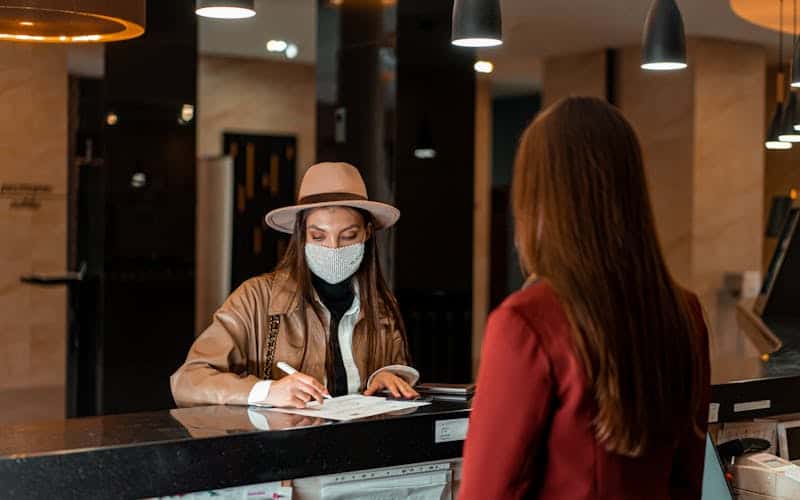Hotels are often considered a home away from home for many travelers. While guests expect privacy and security during their stay, there are situations where law enforcement may need access to guest information.
If you’re short on time, here’s a quick answer to your question: Yes, hotels can give out guest information to the police under certain circumstances.
In this article, we’ll take a closer look at when a hotel can disclose guest information to the police, what type of information can be shared, and what guests can do to protect their privacy.
When Can a Hotel Give Out Guest Information?
As a hotel guest, you may wonder if your personal information is protected from being disclosed to others. However, there are certain situations in which a hotel may be required or allowed to give out guest information to the police or other authorities.
Let’s take a closer look at these situations.
Legal Obligations
Hotels are required by law to collect certain information from their guests, such as their name, address, and credit card details. In some cases, hotels may also be required to share this information with law enforcement agencies.
For example, hotels may be required to report any suspicious activity or behavior by guests to the police, or to provide guest information to the authorities in response to a court order or subpoena.

Emergencies
In emergency situations, hotels may also be authorized to give out guest information to help protect the safety and well-being of their guests and staff.
For example, if a guest is injured or becomes seriously ill, hotel staff may need to provide their personal information to emergency responders or medical personnel.
Similarly, if a guest goes missing or is believed to be in danger, hotel staff may need to provide information to law enforcement agencies to help locate and ensure the guest’s safety.
Criminal Investigations
Hotels may also be required to give out guest information to assist in criminal investigations.
For example, if a guest is suspected of committing a crime on hotel property, hotel staff may need to provide guest information to the police to aid in the investigation.
However, hotels must balance their legal obligations to provide information with their duty to protect guest privacy and ensure that any requests for information are made lawfully and with appropriate justification.
It’s worth noting that hotels may have their own policies regarding guest information, which may go beyond legal requirements.
For example, some hotels may have policies in place to protect guest privacy and limit the disclosure of guest information to third parties. If you have concerns about how your personal information is being handled by a hotel, you can ask to see their privacy policy or speak to a manager about your concerns.
What Type of Information Can Be Shared?
Hotels are often asked by law enforcement to provide information about their guests. While hotels have a duty to protect their guests’ privacy, they may also be required by law to share certain information with the police.
Here are the types of information that can be shared:
Basic Guest Information
Hotels are allowed to share basic guest information with the police, such as the guest’s name, address, phone number, and license plate number.
This information is usually obtained when the guest checks in and is necessary for the hotel to provide service to the guest. It can also help the police locate a guest if they are wanted for questioning or if they are a victim of a crime.
However, hotels should be careful not to share any more information than necessary. For example, they should not share a guest’s nationality, religion, or other personal information that is not relevant to the police investigation.

Room Information
Hotels can also share information about the guest’s room with the police, such as the room number, the check-in and check-out dates, and the number of guests staying in the room.
This information can be useful to the police if they are looking for a suspect or a missing person. However, hotels should not give the police a key to the guest’s room without a warrant. Doing so could violate the guest’s privacy rights and could result in legal action against the hotel.
Financial Information
Hotels can share limited financial information with the police, such as the method of payment and the amount paid for the room. This information can be helpful to the police in tracking a suspect’s movements or in building a case against a suspect.
However, hotels should not share a guest’s credit card information or other financial details without a subpoena or a court order. Doing so could expose the hotel to liability and could result in legal action against the hotel.
It is important for hotels to balance their obligation to protect their guests’ privacy with their duty to assist law enforcement.
By sharing only the information that is necessary and by following proper legal procedures, hotels can help keep their guests safe while also complying with the law.
How Can Guests Protect Their Privacy?
Staying at a hotel can be a convenient and comfortable experience, but it’s important for guests to be aware of their privacy rights and take steps to protect their personal information. One common concern is the possibility of hotels sharing guest information with law enforcement agencies.
So, can a hotel give out guest information to the police? The answer is not straightforward, but there are ways for guests to safeguard their privacy while traveling.
Review the Hotel’s Privacy Policy
Before booking a hotel, it’s a good idea to review the establishment’s privacy policy. This document should outline the hotel’s procedures for handling guest information, including whether they share data with third parties or government agencies.
If you’re not comfortable with the hotel’s policies, you may want to consider another option. Additionally, if you have concerns about your privacy during your stay, you can ask the front desk or management team about their procedures for sharing guest information and what steps they take to protect guest privacy.
Limit Personal Information Provided
When checking into a hotel, guests are typically asked to provide personal information, such as their name, address, and credit card details. While this information is necessary to complete the check-in process, guests can take steps to limit the amount of data they share.
For example, you can ask if it’s possible to use a pseudonym or only provide your first initial.
Additionally, you may want to avoid giving out unnecessary information, such as your phone number or email address, if you’re not comfortable doing so.

Use Cash for Transactions
If you’re concerned about leaving a paper trail of your hotel transactions, using cash can be a good option. By paying in cash, you can avoid having your credit card details shared with the hotel or other third parties.
Additionally, you can ask for a receipt that only includes the necessary information, such as the room rate and payment total, rather than your full name and other personal details.
Conclusion
In summary, hotels can give out guest information to the police, but only under certain circumstances. These circumstances include legal obligations, emergencies, and criminal investigations.
Guests should be aware of what type of information can be shared and take steps to protect their privacy during their stay.
If you have any concerns about your privacy while staying at a hotel, be sure to review the hotel’s privacy policy and limit the personal information you provide.
By taking these steps, you can enjoy a safe and comfortable stay while protecting your privacy.






